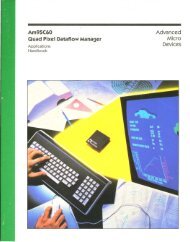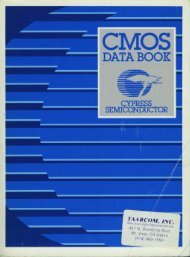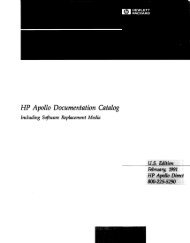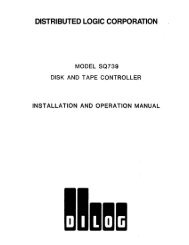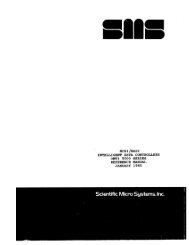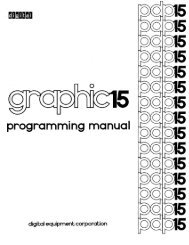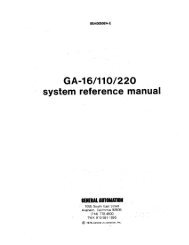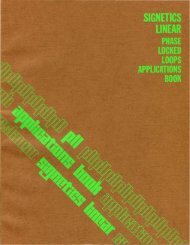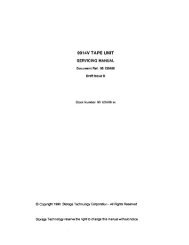- Page 2 and 3:
LITERATUREIn addition to the produc
- Page 4 and 5:
Intel Corporation makes no warranty
- Page 6 and 7:
PREFACEExternal LiteratureMany aspe
- Page 8:
Table of ContentsCHAPTER 1PageINTRO
- Page 11 and 12:
TABLE OF CONTENTSCHAPTER 9PageVIRTU
- Page 13 and 14:
TABLE OF CONTENTSLIST OF FIGURESFig
- Page 15:
Introduction to Protected 1Multitas
- Page 18 and 19:
INTRODUCTION TO PROTECTED MULTITASK
- Page 20 and 21:
inter INTRODUCTION TO PROTECTED MUL
- Page 22 and 23:
111'eI INTRODUCTION TO PROTECTED MU
- Page 24 and 25:
INTRODUCTION TO PROTECTED MULTITASK
- Page 26 and 27:
INTRODUCTION TO PROTECTED MULTITASK
- Page 29:
Using Hardware2Protection Features
- Page 32 and 33:
USING HARDWARE PROTECTION,FEATURESs
- Page 34 and 35:
interUSING HARDWARE PROTECTION FEAT
- Page 36 and 37:
USING HARDWARE PROTECTION FEATURES(
- Page 38 and 39:
USING HARDWARE PROTECTION FEATURES
- Page 40 and 41:
USING HARDWARE PROTECTION FEATUREST
- Page 42 and 43:
USING HARDWARE PROTECTION FEATURESo
- Page 44 and 45:
USING HARDWARE PROTECTION FEATURESL
- Page 46 and 47:
USING HARDWARE PROTECTION FEATUREST
- Page 48 and 49:
USING HARDWARE PROTECTION FEATURESE
- Page 50 and 51:
inl:el~USING HARDWARE PROTECTION FE
- Page 52 and 53:
IntelUSING HARDWARE PROTECTION FEAT
- Page 54 and 55:
IntelU~ING HARDWARE PROTECTION FEAT
- Page 56 and 57:
lSLDTFORMATRt;;SERV~~"O~iA~~.~ijij
- Page 59 and 60:
CHAPTER 3REAL MEMORY MANAGEMENTIn d
- Page 61 and 62:
REAL MEMORY MANAGEMENTIALLOCATEGATE
- Page 63 and 64:
interREAL MEMORY MANAGEMENTBEFOREAF
- Page 65 and 66:
REAL MEMORY MANAGEMENTGLOBAL DESCRI
- Page 67 and 68:
REAL MEMORY MANAGEMENTTable 3-1. Ac
- Page 69 and 70:
REAL MEMORY MANAGEMENTBEFOREI "FREE
- Page 71 and 72:
REAL MEMORY MANAGEMENTBEFOREI "FREE
- Page 73 and 74:
REAL MEMORY MANAGEMENTPL/M-286 COMP
- Page 75 and 76:
REAL MEMORY MANAGEMENTPL/M-286 COMP
- Page 77 and 78:
REAL MEMORY MANAGEMENTPL/M-286 COMP
- Page 79:
REAL MEMORY MANAGEMENTPL/M-286 COMP
- Page 82 and 83:
IIIIIIIIIIIIIIIIIIIIII
- Page 84 and 85: II I telTASK MANAGEMENTCPUTASK REGI
- Page 86 and 87: TASK MANAGEMENTIf the proc~sser, wh
- Page 88 and 89: TASK MANAGEMENTUsually, termination
- Page 90 and 91: TASK MANAGEMENTTASK XTSS TSS TSS TS
- Page 92 and 93: TASK MANAGEMENTSCHEDULING POLICIEST
- Page 94 and 95: TASK MANAGEMENTThe example in figur
- Page 96 and 97: TASK MANAGEMENTREADY QUEUESBY PRIOR
- Page 98 and 99: IIIIIIIIIIIIIIIIIIIIIIIIIIIIIIIIIII
- Page 101 and 102: CHAPTER 5DATA SHARING, ALIASING, AN
- Page 103 and 104: DATA SHARING, ALIASING, AND SYNCHRO
- Page 105 and 106: interDATA SHARING, ALIASING, AND SV
- Page 107 and 108: DATA SHARING, ALIASING, AND SYNCHRO
- Page 109 and 110: DATA SHARING, ALIASING, AND SYNCHRO
- Page 111 and 112: DATA SHARING, ALIASING, AND SYNCHRO
- Page 113 and 114: DATA SHARING, ALIASING, AND SYNCHRO
- Page 115 and 116: DATA SHARING, ALIASING, AND SYNCHRO
- Page 117: DATA SHARING, ALIASING, AND SYNCHRO
- Page 121 and 122: CHAPTER 6SIGNALS AND INTERRUPTSInte
- Page 123 and 124: interSIGNALS AND INTERRUPTSlOTGOTTS
- Page 125 and 126: SIGNALS AND INTERRUPTSTable 6-1. In
- Page 127 and 128: SIGNALS AND INTERRUPTSSend interrup
- Page 129 and 130: SIGNALS AND INTERRUPTSprocedure suc
- Page 131: Handling Exception Conditions 7
- Page 136 and 137: HANDLING EXCEPTION CONDITIONSAn exc
- Page 138 and 139: HANDLING EXCEPTION CONDITIONSA few
- Page 140 and 141: HANDLING EXCEPTION CONDITIONSAn ins
- Page 143 and 144: CHAPTER 8INPUT /OUTPUTMany of the c
- Page 145 and 146: INPUT /OUTPUTYou can still take adv
- Page 147 and 148: INPUT /OUTPUT• Only the operating
- Page 149: INPUT /OUTPUTtask the I/0 procedure
- Page 153 and 154: CHAPTER 9VIRTUAL MEMORYThe memory l
- Page 155 and 156: VIRTUAL MEMORYthose segments that a
- Page 157 and 158: VIRTUAL MEMORY• Return the RAM sp
- Page 159 and 160: VIRTUAL MEMORYReplacementThe operat
- Page 161 and 162: System Initialization10
- Page 163 and 164: CHAPTER 10SYSTEM INITIALIZATIONThe
- Page 165 and 166: SYSTEM INITIALIZATIONStarting the f
- Page 167 and 168: iAPX286 "ACRO ASSEMBLERLOCOBJEnter
- Page 169 and 170: iAPX286 MACRO ASSEMBLEtEnter Protec
- Page 171 and 172: iAPX286 MACRO ASSEMBLER·· Enter ~
- Page 173 and 174: iAPX286 'UCRO USE148LER Ente,. P,.o
- Page 175 and 176: iAPX286 MACRO ASSEMBLEREnt9~ P~otec
- Page 177: iAPX286 MACRO ASSEMBLE~ INITIAL TAS
- Page 181 and 182: CHAPTER 11BINDING AND LOADINGBindin
- Page 183 and 184: BINDING AND LOADINGNamingThe names
- Page 185 and 186:
BINDING AND LOADING$ COMPACT (NUCLE
- Page 187 and 188:
interBINDING AND LOADINGsystem-IDiA
- Page 189 and 190:
BIND.ING AND LOADINGConverting a Pr
- Page 191 and 192:
BINDING AND LOADINGThe OMF of each
- Page 193 and 194:
interBINDING AND LOADINGsystem-IDiA
- Page 195 and 196:
BINDING AND LOADINGPL/M-2B6 COMPILE
- Page 197 and 198:
BINDING AND LOADI.NGPL/M-286 COMPIL
- Page 199 and 200:
BINDING AND LOADINGPL/M-286 COMPILE
- Page 201 and 202:
BINDING AND LOADINGPL/M-2B6 COMPILE
- Page 203 and 204:
BINDING AND LOAD.INGPL/M-286 COMPIL
- Page 205 and 206:
interBINDING AND LOADINGPL/M-286 CO
- Page 207 and 208:
BINDING AND LOADINGPL/M-286 COMPILE
- Page 209:
Numerics Processor Extension 12
- Page 212 and 213:
NUMERICS PROCESSOR EXTENSIONMath Pr
- Page 214 and 215:
interNUMERICS PROCESSOR EXTENSION
- Page 217:
Extended Protection13
- Page 220 and 221:
EXTENDED PROTECTIONIndirect NamingT
- Page 222 and 223:
EXTENDED PROTECTIONanother procedur
- Page 225:
Glossary
- Page 228 and 229:
GLOSSARYbootloadable module: a modu
- Page 230 and 231:
GLOSSARYexception: a processor-dete
- Page 232 and 233:
GLOSSARYintersegment reference: a r
- Page 234 and 235:
GLOSSARYoutward call: the attempt t
- Page 236 and 237:
GLOSSARYscheduling state: one of se
- Page 238 and 239:
GLOSSARYvirtual address: an address
- Page 240 and 241:
INDEXES register, 2-17, 2-18, 2-21,
- Page 242 and 243:
INDEXpresent bit, 2-2, 2-3, 2-9, 5-
- Page 245 and 246:
interu.s. SALES OFFICESALAIWIA IlEQ
- Page 247 and 248:
interu.s. DISTRIBUTORSNEW YORK (C"n
- Page 249 and 250:
intJINTEL INTERNATIONAL SALES OFFIC




